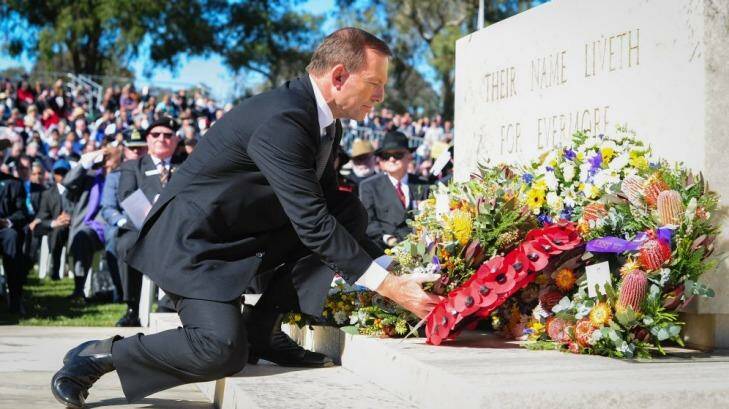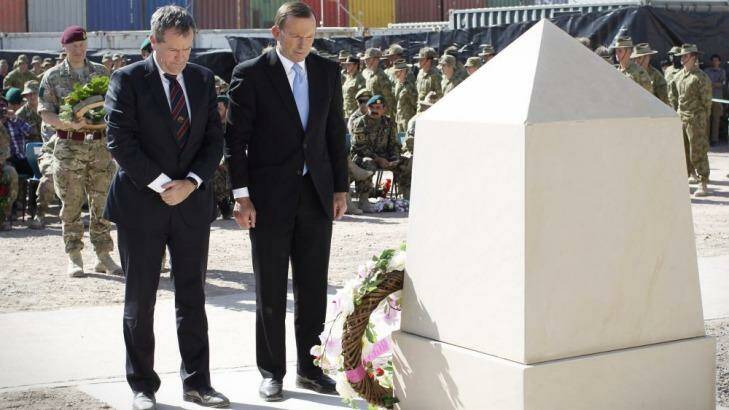

Western Front as important as Gallipoli: PM
As someone who has never served in the armed forces, never faced a shot fired in anger, and never lost close family members in war, I am in awe of the Anazac generation, who were tested almost beyond endurance.
Today, we remember the Gallipoli landing.
Yet this was just one day and Gallipoli was but one campaign in a four year war.
On the 99th anniversary of Australia’s baptism of fire, we remember that fateful day.
We also remember the great tide of events – of which Gallipoli was just one part – that shaped our nation and that still casts its shadow over the wider world.
The First World War impacted Australia like nothing else, before or since.
From a population under five million; 417,000 enlisted; 332,000 served overseas; 152,000 were wounded; and 61,000 never came home.
Of men aged 18 to 42, almost one in two served in uniform.
Of those who served overseas, almost one in five died on active service.
Of the 270,000 who returned, more than half had been wounded – and others had mental scars that never healed.
Individually and collectively, it was sacrifice on a stupendous scale.
But what was the alternative, in Britain’s time of need, and when Europe was at risk from Prussian militarism?
Over the next four years that mark the centenary of the Great War, we will remember all the key events in which Australia was involved.
This September is the anniversary of Australia’s first military action: the capture of German New Guinea.
In November, we will remember the sailing of the first Anzac convoy guarded by a Japanese cruiser, as well as HMAS Sydney, and ships of the Royal Navy.
Inevitably, the 25th of April next year will be a high point but there will be other Gallipoli centenaries: Lone Pine, the Nek, and – the only unambiguously successful part of that campaign – the evacuation.
We will remember the charge at Beersheba and the capture of Jerusalem and Damascus, spearheaded by the Australian Light Horse.
Above all else, we should remember the Western Front, not just for its carnage, but also for Australia’s moment on the stage of history.
When the last big German offensive split the British and French armies in March and April 1918, it was largely the Australians that plugged the gap and held the line.
In the closing months of the war, the five divisions of the First Australian Imperial Force, fighting together for the first time, bested no fewer than 39 enemy divisions, took 29,000 prisoners, captured 338 guns and advanced over 40 miles of contested ground.
The AIF were less than a tenth of all British Empire forces but made nearly a quarter of all the gains.
It’s the only time in history when Australian forces have engaged the main enemy on the main battlefront and made an appreciable difference to the outcome.
When all is said and done, Gallipoli was a defeat; but the Western Front a victory.
Victories, even terrible ones, should be no less iconic than heroic defeats.
That’s why one of the main outcomes of the centenary of Anzac will be an interpretive centre honouring General Monash and his men focused on the Australian National Memorial at Villers Bretonneux.
Whether it’s the organisational skill of Monash who perfected the “all arms” battle – the coordination of artillery, infantry, armour and aircraft – to turn stalemate into victory on the Western Front; the legendary self-sacrifice of Simpson with his donkey at Gallipoli; or the story of nurse Rachael Pratt tending to the wounded in France despite being herself hit by artillery fire, the centenary of Anzac should mean, for all of us, pondering anew the example of our mighty forbears.
We should be a nation of memory, not just of memorials, for these are our foundation stories.
They should be as important to us as the ride of Paul Revere, or the last stand of King Harold at Hastings, or the incarceration of Nelson Mandela might be to others.
We commemorate Anzac Day every year and will commemorate the centenary of Anzac over the next four years because the worst of times can bring out the best in us.
As the official historian, Charles Bean, put it: “during four years in which nearly the whole world was so tested, the people of Australia looked on…They saw their own men – those who had dwelt in the same street or been daily travellers in the same trains – flash across the world’s consciousness like a shooting star.
“In the first straight rush up the Anzac hills in the dark; in the easy figures first seen on the ridges in the dawn sky; in the working parties stacking stores on the shelled beach without the turning of a head; in the stretcher bearers walking, pipes in mouths, down a bullet-swept slope to a comrade’s call, unconsciously setting a tradition that may work for centuries; in things seen daily from that first morning until the struggle ended, onlookers had recognised in these men qualities always vital to the human race.
“Australians watched the name of their country rise high in the esteem of the world’s oldest and greatest nations. Every Australian bears that name proudly abroad today and by these daily doings, great and small ... the Australian nation came to know itself”.
Our commemorations today, as throughout the centenary, do not and will not glorify war; rather they honour what’s best and noblest in human nature.
Australian soldiers have been called upon to do the terrible deeds that war requires but have remained decent people.
Mateship, humour, and respect for an honourable foe – as well as an implacable will to win – have characterized the Australian soldier from that day to this: in World War II, Korea and Vietnam; in Iraq, Afghanistan and all the other places where Australians have served.
Members of our armed forces have done what most of us are never asked to do: they have been prepared to put their lives on the line for our country.
We honour those who have done what we have not; and hope that we might find it in ourselves to rise to the supreme challenge, as they did, should we ever be put to the test.
On the half century of Anzac, 49 years ago today, Queen Elizabeth said: “in remembering the courage of those who did so much to ensure victory, we…draw strength to face the problems of our own time”.
This Anzac Day, we welcome amongst us Prince William, the Queen’s grandson and a Royal Air Force search and rescue pilot.
Long ago, we ceased to regard Britain as the mother country but we’re still family.
Your presence Sir, reminds us of all our comrades-in-arms.
These are the ties that bind.
Lest we forget.
Prime Minister Tony Abbott gave this address to the Anzac Day national ceremony at the Australian War Memorial, Canberra.
Subscribe now for unlimited access.
$0/
(min cost $0)
or signup to continue reading

